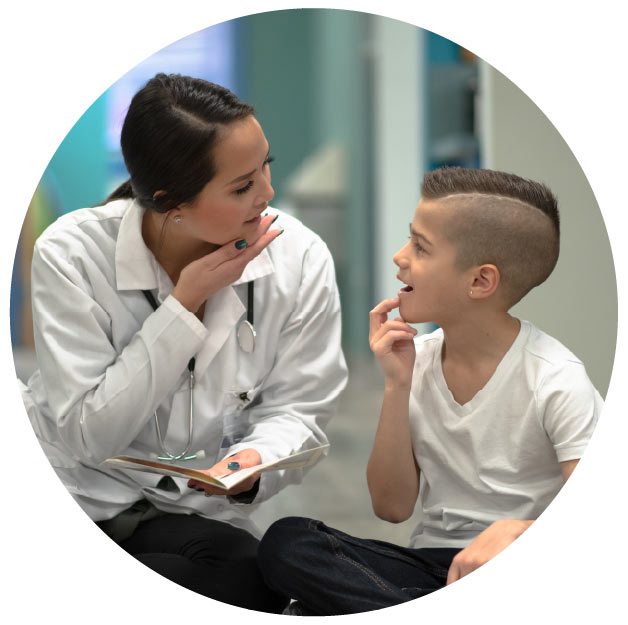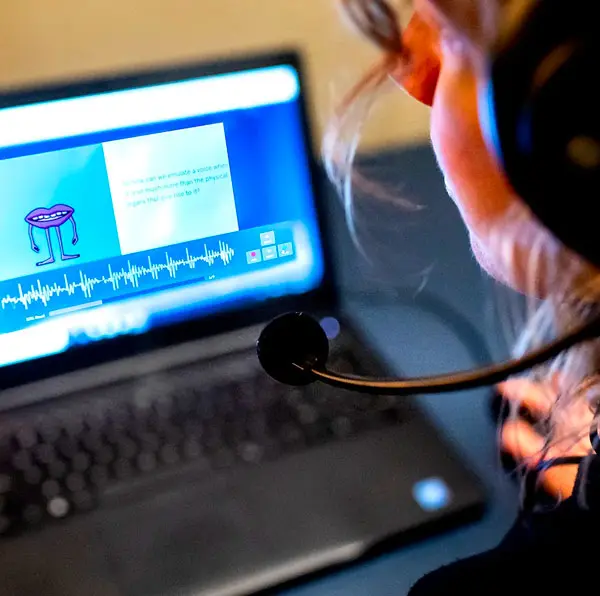
communication beyond BOUndaries

We offer diagnostic hearing evaluations and more.
We offer help with a broad range of speech-language issues.

We’re here to help you with the below issues and disorders.
All our staff are certified by the American Speech-Language and Hearing Association (ASHA) and licensed by the Massachusetts Board of Registration of Speech-Language Pathology and Audiology. The Center is licensed by the Department of Public Health and follows the Health Insurance Portability and Accountability Act (HIPAA) Privacy and Security Rules.

8:30 AM – 5:00 PM
Monday to Friday
University semester schedule:
Fall, spring, and summer
617-373-2492
[email protected]
Speech-Language and Hearing Center
Behrakis Health Sciences Center
30 Leon St.
Boston, MA 02115
ACT involves direct instruction and models for articulation (the way sounds are produced) and prosody (the melody of speech) in Mainstream American English (MAE). It provides opportunities to practice learned skills in a variety of communication settings and situations (e.g., presentations, interviews, ordering food), as well as direct feedback on performance from the instructors.
Aphasia is a communication disorder that results from neurological damage to the language areas of the brain (typically in the left hemisphere). Aphasia may cause difficulties in speaking, listening, reading, and writing.
Services for individuals with aphasia focus on activities to improve specific language skills and develop strategies to improve overall communication in a variety of situations. The NUSLHC offers individual sessions, as well as group therapy services for individuals with aphasia who wish to work with and learn from others with similar language difficulties.
Apraxia of speech is a disorder of motor speech planning. Those with apraxia do not have any muscle weakness or paralysis, but they have trouble speaking because of a communication breakdown between the brain and the muscles of the lips, jaw, tongue, etc. needed to produce speech.
Speech intervention for apraxia is frequent and intense, and involves working to improve the planning, sequencing, and coordination of muscle movements for speech production with multi-sensory feedback.
We provide comprehensive augmentative and alternative communication (AAC) evaluations including:
We conduct trials with speech generating devices (SGDs) and provide an AAC evaluation report that can be submitted to third-party funders (e.g., private insurance companies).
At our clinic, we take an unusual approach to AAC evaluations. We carefully consider how the individual communicates across all modes of communication including gestures, facial expressions, and guiding people’s hands.
We access parent expertise during the interview process and incorporate family perspectives throughout the assessment process. We take the time to review what has been tried in the past through parent interview and record review. Finally, we consciously consider the best language representation methods for the individual to provide efficient access to a robust vocabulary to meet their needs.
Aural Rehabilitation (AR) is for individuals with hearing loss, including those who wear hearing aids and/or have cochlear implants.
AR services include helping individuals adjust to hearing loss, learn communication strategies to manage conversations, learn speechreading skills, practice self-advocacy skills, get support from others, and maximize and explore the use of assistive listening devices.
When an individual has a Central Auditory Processing Disorder (APD), the central nervous system has difficulty processing information that is heard. This can affect how the brain processes spoken language, and can cause difficulty processing verbal instructions or even filtering out background noise.
APD services include training individuals to improve auditory recognition, helping to strengthen language, memory, and attention to compensate for difficulties with auditory processing, and making environmental modifications to enhance the individual’s listening environment.
A cognitive-linguistic disorder is defined as difficulty with any aspect of communication that is affected by disruption of attention, memory, organization, problem solving/reasoning, or executive functions. Deficits in these areas can affect speaking, listening, reading, writing, and social skills, as well as an individual’s daily functioning.
Treatment for people with cognitive-linguistic disorders can include training or re-training cognitive processes, teaching specific functional skills, developing compensatory strategies and support systems, and providing caregiver training.
Dysarthria is a motor speech disorder that results from impaired movement of the muscles used for speech production (lips, tongue, vocal folds, and/or diaphragm). Dysarthria is caused by damage to the brain, which may occur at birth or later in life due to one of many different conditions that involve the nervous system.
Services for dysarthria include slowing the rate of speech, improving breath support for production of louder speech, strengthening muscles and increasing tongue and lip movement to improve speech production, and in severe cases, possibly teaching the individual to use alternative means of communication (AAC devices).
Expressive language refers to an individual’s production (output/talking) of language and receptive language refers to an individual’s understanding (input/listening) of other’s language. Deficits in these areas may indicate a language delay or disorder. Individuals with a language delay/disorder may have difficulty with a variety of language tasks such as following directions, answering questions, naming objects, or putting words together into sentences.
Interventions include teaching and practicing language skills to increase an individual’s understanding of and production of language.
Literacy disorders can include difficulties in any of the following areas: phonological awareness, phonological processing, decoding, word reading/recognition, listening and reading comprehension. These difficulties can present as dyslexia, comprehension disorders, and mixed and non-specified reading disorders.
Interventions for literacy disorders include providing individuals with the necessary strategies to acquire skills for decoding and encoding of written text, as well as comprehension and formulation of language in a variety of contexts.
People with pragmatic language and social communication disorders may have difficulty using language in various social situations, particularly in knowing what to say, how to say it, when to say it, and generally how to “act” around other people.
Services for pragmatic language disorders focus on explicit teaching of these skills for use in social situations that the individual encounters every day, in addition to practicing these skills in functional situations to ensure carry-over.
A speech sound disorder/delay occurs when the speech sound mistakes that children make as they are learning new words continue past an appropriate age. Speech sound disorders include problems with articulation (producing certain sounds) and phonological patterns (speech sound patterns).
Services for speech sound disorders and delays involve models of how to produce the sound correctly, teaching to recognize the difference between correct and incorrect sounds, practicing sounds in different contexts, and teaching the rules and sound patterns of speech to support correct productions.
Stuttering affects the fluency (smoothness/flow) of speech. It begins during childhood and sometimes lasts throughout life. The disorder is characterized by disruptions in production of speech sounds, also called “dysfluencies.” Dysfluencies can have a negative impact on a person’s communication with others if the frequency of occurrence is great, or the nature of dysfluency is severe.
Services for people who stutter include teaching and practicing a range of specific strategies to improve fluency during oral communication.



Prior to starting therapy, you must have had an evaluation completed within the last six months and recommendations for services.
We maintain a waiting list for prospective clients for evaluations and therapy sessions, but currently have openings for evaluations and treatment. To secure a slot on this list, please do as follows.
Step 1
Complete one of the application forms. If you completing this for an individual under the age of 18, please fill out the Child Application Form. Answer all the questions as completely as you can; the information on this form will be confidential.
Step 2
Please email your completed form to [email protected]. Please be sure to include any recent evaluation reports or relevant documentation along with your application form.
If you’re completing the form by hand, kindly choose and fax the Application Form — Fax to 617-373-8756.
Step 3
Once we receive your form, we will begin the process of scheduling and planning an appointment for you/your child. If there are any difficulties opening the links, please call the Center at 617-373-2492.
Initial evaluation appointments take about two hours. After the evaluation, information regarding recommendations will be provided, which may include therapy, additional testing, or seeking out other resources outside the Center.
Further inquiries can be directed to:
Caren McDonough
Clinic Director
[email protected]
The Center provides therapy and evaluations on a fee-for-service policy during the university semester schedule. Fees are as follows:
These fees do not apply to ACT (Accent & Communication Training), Word Detectives, or reading tutoring services.
We accept checks, credit cards, or money orders; insurance reimbursement and cash payments are not accepted.
For individuals with financial need, a payment plan or a reduced fee may be requested.
Universal masking at the Speech-Language and Hearing Center will be optional for all staff, patients, and clients.
Masks will still be available at the front desk if you prefer to wear one.
Please let us know if you would like your clinician or provider to wear one during your appointment.
Additionally, if you are experiencing symptoms, please consider wearing a mask to decrease the risk of illness transmission within the Center.